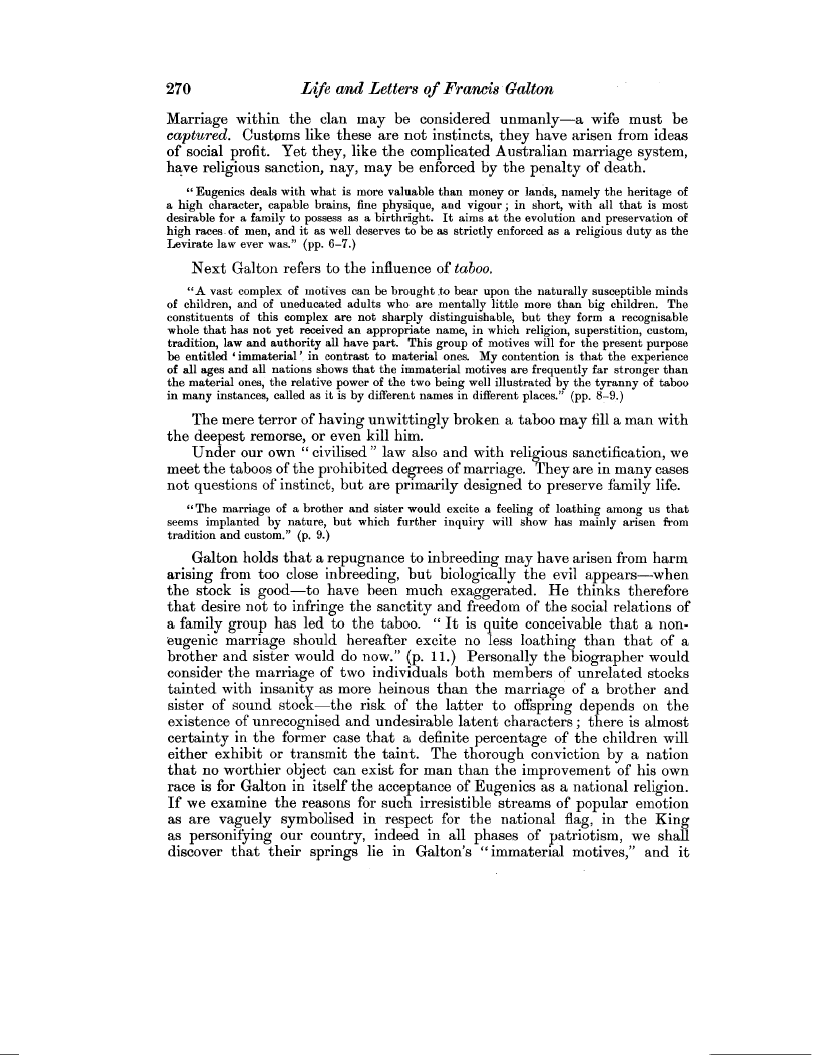| ||||||

OCR Rendition - approximate
270 Life and Letters of Francis Galton Marriage within the clan may be considered unmanly-a wife must be captured. Customs like these are not instincts, they have arisen from ideas of social profit. Yet they, like the complicated Australian marriage system, have religious sanction, nay, may be enforced by the penalty of death. '° Eugenics deals with what is more valuable than money or lands, namely the heritage of a high character, capable brains, fine physique, and vigour ; in short, with all that is most desirable for a family to possess as a birthright. It aims at the evolution and preservation of high races. of men, and it as well deserves to be as strictly enforced as a religious duty as the Levirate law ever was." (pp. 6-7.) Next Galton refers to the influence of taboo. "A vast complex of motives can be brought .to bear upon the naturally susceptible minds of children, and of uneducated adults who are mentally little more than big children. The constituents of this complex are not sharply distinguishable, but they form a recognisable whole that has not yet received an appropriate name, in which religion, superstition, custom, tradition, law and authority all have part. This group of motives will for the present purpose be entitled ' immaterial', in contrast to material ones. My contention is that the experience of all ages and all nations shows that the immaterial motives are frequently far stronger than the material ones, the relative power of the two being well illustrated by the tyranny of taboo in many instances, called as it is by different names in different places." (pp. 8-9.) The mere terror of having unwittingly broken a taboo may fill a man with the deepest remorse, or even kill him. Under our own " civilised " law also and with religious sanctification, we meet the taboos of the prohibited degrees of marriage. They are in many cases not questions of instinct, but are primarily designed to preserve family life. "The marriage of a brother and sister would excite a feeling of loathing among us that seems implanted by nature, but which further inquiry will show has mainly arisen from tradition and custom." (p. 9.) Galton holds that a repugnance to inbreeding may have arisen from harm arising from too close inbreeding, but biologically the evil appears-when the stock is good-to have been much exaggerated. He thinks therefore that desire not to infringe the sanctity and freedom of the social relations of a family group has led to the taboo. " It is quite conceivable that a noneugenic marriage should hereafter excite no less loathing than that of a brother and sister would do now." (p. 11.) Personally the biographer would consider the marriage of two individuals both members of unrelated stocks tainted with insanity as more heinous than the marriage of a brother and sister of sound stock-the risk of the latter to offspring depends on the existence of unrecognised and undesirable latent characters ; there is almost certainty in the former case that a definite percentage of the children will either exhibit or transmit the taint. The thorough conviction by a nation that no worthier object can exist for man than the improvement of his own race is for Galton in itself the acceptance of Eugenics as a national religion. If we examine the reasons for such irresistible streams of popular emotion as are vaguely symbolised in respect for the national flag, in the King as personifying our country, indeed in all phases of patriotism, we shall discover that their springs lie in Galton's " immaterial motives," and it
|